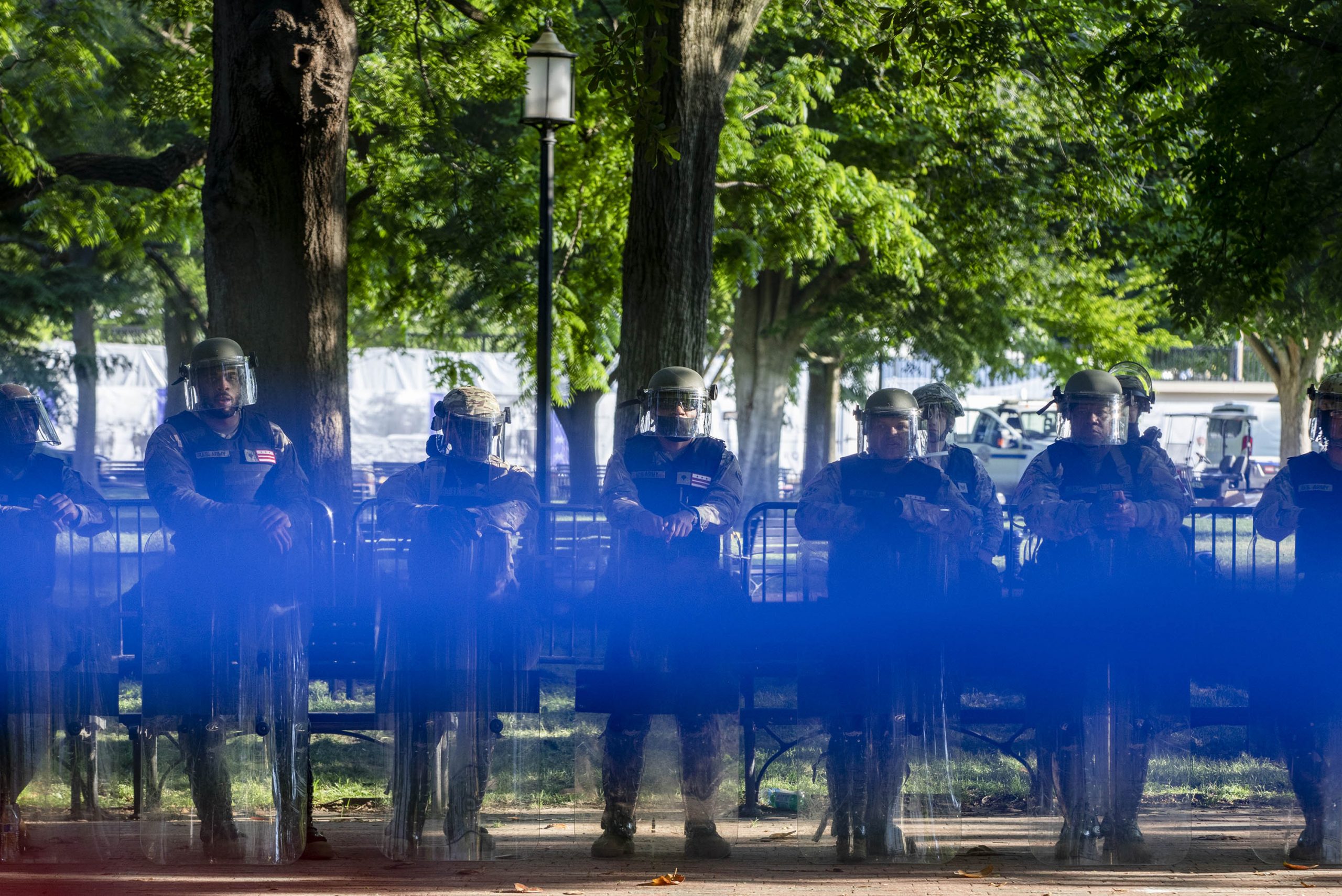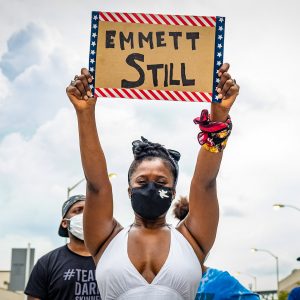Police: Attack dogs for the status quo
In this first in a series on the history of police violence, New Frame links the uprising after the murder of George Floyd to centuries of global state oppression enforced by cops.
Author:
13 July 2020

The revolt sparked by the police murder of an unarmed black man, George Floyd, has gripped the world’s attention. In South Africa, where the police continue to brutalise and murder impoverished black people, Floyd’s murder has a profound resonance. From the Marikana massacre to everyday acts of abuse and violence, police terror in this country is a national problem, which reflects a global reality of state violence enacted by the cops.
Protesters across the globe are calling for a reckoning with the modern police, a violent, repressive and racist institution, which they see as a mechanism to repress marginalised and oppressed people through intimidation and lethal violence.
Related article:
In an era of grinding austerity, where countries like the United States fail to deploy resources to protect their citizens from the Covid-19 pandemic, police departments remain lavishly funded with military-grade weapons and advanced surveillance technology.
In the first days of the uprising, which culminated in the torching of the 3rd precinct police building in Minneapolis, street protesters and their online supporters chanted, waved placards and made memes with phrases such as “Fuck the Police”, “Fuck 12” and “ACAB (All Cops are Bastards)” to convey their moral fury. These slogans were quickly accompanied by an even more radical cry: “Abolish the Police.”

Liberals and even some conservatives accept the necessity for police reform, but view the cops as a legitimate, necessary institution that protects public safety and upholds order. Without the police, they argue, society would be left defenceless against all kinds of criminals, villains, “folk devils” and other so-called social deviants.
In contrast, radicals are calling for a deeper social transformation than piecemeal reform. They argue police primarily serve established political and economic interests. Rather than acting for a common good, police violently manage the social problems caused by inequality and economic impoverishment. Rather than making societies safer and freer, they serve as capricious armies of occupation.
The sheepdogs
Instead of reform, radicals want the police first to be defunded. This means money currently spent on riot gear, tanks and prisons would be redirected to social services that materially improve people’s lives and respond to the root causes of crime.
But defunding is only a transitional demand. What is being called for is abolition, the replacement of today’s inefficient police forces with alternate social mechanisms to democratically and peacefully resolve conflict and create public safety.
For some, the call to abolish the police may seem dangerously utopian – who would we call to report a crime? Who would keep our society safe?
Related article:
Indeed, the police would like the public to believe they are our armed guardians. As scholars and activists David Correia and Tyler Wall argue, police ideology is full of Hobbesian ideas about there being only a thin line between “savagery” and order. The cops are imagined as sheepdogs protecting the herd (which is us, the ignorant, helpless masses) from danger.
But the reality is that the everyday routine of policing is not a high-octane battle to preserve civilisation. Rather than actively preventing or deterring serious crimes like murder or sexual assault, police generally only intervene after the harm is already done.
Much of the police day is spent patrolling, responding to complaints and enforcing bylaws. Empowered by the state to detain and use lethal force, the daily preservation of order often translates into controlling and abusing the impoverished and marginal.

The class distribution of policing is so overt that already in 1894 the French poet Anatole France could observe: “In its majestic equality, the law forbids rich and poor alike to sleep under bridges, beg in the streets and steal loaves of bread.”
Policing is fundamentally a political activity, as police generally side with upholding the status quo. They regularly infiltrate and intimidate political activism and social movements as part of their public order mandate. For example, at climate demonstrations you will often see uniformed officers filming organisers and protesters. Are we to believe that the police apply the same level of intrusive surveillance to corporate chief executives involved in wrecking the environment for short-term profit, a legalised criminality that imperils humanity’s very future?
Police services globally are well-equipped to harass vagrants or political dissidents, but far less successful at dealing with the powerful’s systematic law breaking – including organised crime, white-collar crime and political corruption – which ultimately causes the greatest social dysfunction.
Histories of violence
As Alex Vitale demonstrates in his book, The End of Policing, police institutions did not spontaneously emerge to enforce public order in response to a social need for security. Instead, the police are a historically contingent institution initially established to maintain colonialism and industrial capitalism.
For most of human history, “body and property” security was controlled by private and communal processes. While the rich might hire private militias or night watches, common people turned to clans or informal mechanisms for justice or retribution.
This began to change as centralised states emerged in early modern Europe. The new bourgeoisie capitalist ruling class was presented with the problem of “public order” – the proletarian bodies of a newly emerging working class. In the colonies of the Americas, slave owners were terrified by the prospect of subjugated people revolting or rising up. In Europe, the masses being pushed off farmland and into newly industrialising cities were seen as barbarians who needed to be moulded into obedient, politically inactive workers.

Governments found that using excessively violent military force, such as the British Army’s massacre of pro-democracy demonstrators in Manchester in 1818, only fuelled resistance. They wanted a new force, capable of suppression but with greater public legitimacy and an administrative capacity to manage order.
In 1829, Sir Robert Peel founded the London Metropolitan Police, the “bobbies”, often regarded as the first modern professional police force. Peel explicitly drew inspiration from his time in colonised Ireland, where the British ruled through “force and famine”. In a process that continues to this day, colonised spaces became the testing ground for new forms of social control.
The “hordes of blue locusts” were there to enforce new social values, keep marginalised populations in line and protect business interests. The British model, along with other European experiments in criminology, boomeranged back to the colonised world.
Here, existing forms of settler social control, such as slave patrols in the United States, would be combined with new organisational models to create police institutions. From Algeria to the Philippines, these police forces were corrupt and brutal, focusing more on strike breaking and extortion than on stopping crime. Historical research continues to highlight how the colonial police of powers such as France and Britain were responsible for sustained racist oppression.
Related article:
But the police also used more sophisticated methods than only brute force. New ideas about threats to bourgeois order were used to pathologise democratic and socialist movements. The 1871 Paris Commune inspired the reactionary sociologist Gustave Le Bon to warn of the political danger of the “crowd’, which in his view, “intended to utterly destroy society as it now exists” by “the equal distribution of all products, the elimination of all the upper classes for the benefit of the popular classes, etc”.
Le Bon’s paranoia around collective politics continues to inform policing today and encourages officers to view protesters and dissidents as objects to be controlled, rather than as subjects expressing their rights as human beings.
The authoritarian bias built into policing allowed cops to be instruments for the worst state violence and atrocities of the 20th century. In Germany, rather than building a new system from scratch, the Nazis turned the existing Weimar Police into a genocidal force. When he came to power in 1933, Adolf Hitler assured his support among police officers by increasing both their budgets and their capacity for social repression.

Almost a century later, the recent events in the US show that every ostensible liberal democracy has failed to resolve police violence against civilian populations. In cities as disparate as New York and Johannesburg, police services are empowered to use military-grade equipment and counter-insurgency tactics honed in warzones to enforce order.
While other social institutions fall into underfunded neglect, police departments are richly supported in endless “wars” on crime, drugs and terror. The expansion of police powers has been fuelled by conservative ideologies around disorder and “broken windows” policing, which regulates space and society “appropriate for capital, targeting the poor, people of colour, queers, trans and gender-nonconforming people, immigrants, the homeless and youth when their existence is not conducive to the accumulation process”.
Despite pro-police public relations exercises and a media that often uncritically romanticises cops, the business of policing remains fundamentally fixed on patrolling segregation, inequality and illegitimate hierarchies.








